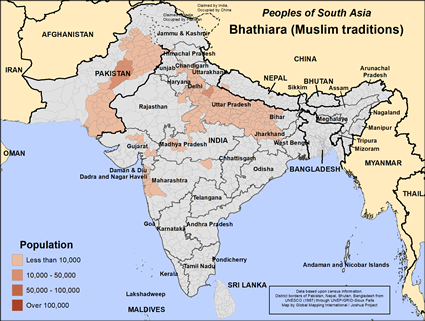The Bhathiara are a Muslim people who live in Pakistan and north India. Their name comes from a word for "boiled rice." The Bhathiara claim to be descendants of the last Pathan ruler of the Suri Empire of the 16th century. The traditional occupation of the Bhathiara was that of innkeeper. They would provide shelter and feed Muslims along the trade routes of north India and Pakistan. The Bhathiara would provide a mat and a place to sleep for a modest price. They would sell the traveler rice, curry, kabobs, and water. During the Mughal period they were provided with royal patronage.
The Bhathiara speak various languages including Saraiki, Urdu, Western Punjabi and Sindhi. Many Muslim Bhathiara left India and relocated to Pakistan during the Partition of India in 1947. Most Bhathiara live in the Pakistani states of Punjab and Kyber-Pakhtunkhwa. Others live in Sindh and Islamabad. The Bhathiara often live in their own sections of the cities and villages.
The job of being innkeepers has declined among the Bhathiara in modern times. Now many Bhathiara work in agriculture, factories and in small businesses. Some Bhathiara have taken advantage of Pakistan's educational system and become professionals in medicine, law, engineering, and computer science.
Lack of education is a problem among the Bhathiara women. The literacy rate among their women is only 62%.
The Bhiathiara are strictly endogamous, that is, they marry within their caste and clan. Families arrange marriages with the consent of the young people. Sons inherit their father's property. Newly married couples frequently live with or near the groom's parents. Muslim priests officiate at important life events like births, weddings and funerals. The Bhathiara bury their dead. The sons have the responsibility of caring for elderly parents. Bhiathiara tend to have large families as children are seen as Allah's blessing
The Bhiathiara eat meat except for pork. Their main foods are wheat, rice, lentils, vegetables, and dairy products.
Caste councils promote their interests and settle legal disputes.
The Bhathiara people are Sunni Muslims. They believe that the supreme God, Allah, spoke through his prophet, Mohammed, and taught mankind how to live a righteous life through the Koran and the Hadith. To live a righteous life, you must utter the Shahada (a statement of faith), pray five times a day facing Mecca, fast from sunup to sundown during the month of Ramadan, give alms to the poor, and make a pilgrimage to Mecca if you have the means. Muslims are prohibited from drinking alcohol, eating pork, gambling, stealing, slandering, and making idols. They gather for corporate prayer on Friday afternoons at a mosque, their place of worship.
The two main holidays for Sunni Muslims are Eid al Fitr, the breaking of the monthly fast and Eid al Adha, the celebration of Abraham's willingness to sacrifice his son to Allah.
Sunni religious practices are staid and simple. They believe that Allah has pre-determined our fates; they minimize free will.
In most of the Muslim world, people depend on the spirit world for their daily needs since they regard Allah as too distant. Allah may determine their eternal salvation, but the spirits determine how well we live in our daily lives.
There are few if any believers among the Bhiathiara.
The Bhathiara need to hear and understand the life-changing message of Isa or Jesus. They need to see the love and mercy of Christ lived out in practical ways before them by Christians. They would benefit from job training. They need help in educating their women and children.
Ask the Lord to send loving workers to the Bhiathiara.
Pray for Bhathiara families to be drawn to Jesus and to the Bible.
Pray for Bhathiara families and communities to discover and embrace the free gift of life found by trusting Christ and his finished work.
Pray that the Bhathiara would be open to the gospel and that the Lord would raise up Bible-believing churches among them in this decade
Scripture Prayers for the Bhathiara (Muslim traditions) in Pakistan.
en.wikipedia.org/wiki/Bhathiara
http://indpaedia.com/ind/index.php/Bhatiara
| Profile Source: Joshua Project |











